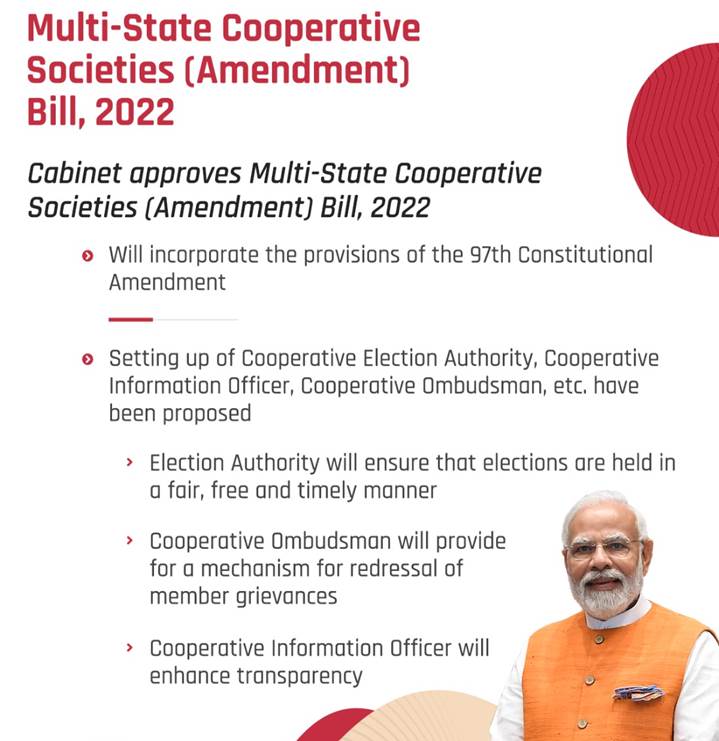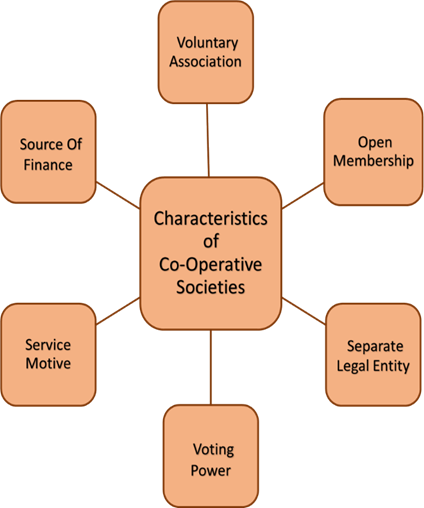Description

Copyright infringement not intended
In News
- The Union Government has introduced the Multi-State Cooperative Societies (Amendment) Bill, 2022 in the lok sabha.
- The amendment bill aims to make the governance of multi-State cooperative societies more democratic, transparent and accountable.
Details
- The Bill has the provisions of the 97th Constitution Amendment act which provides Constitutional status and protection to cooperative societies.
- It aims to improve the composition of boards and ensure fiscal discipline.
- The Bill has provisions for setting up a Cooperative Election Authority, a Cooperative Information Officer and a Cooperative Ombudsman.
- Provisions relating to the representation of women and Scheduled Caste/Scheduled Tribe members on the boards of multi-State cooperative societies have been included to promote equity and facilitate inclusiveness.
Cooperative Societies in India
- A Cooperative Society can be defined as a voluntary association of individuals united voluntarily to meet their common economic, social, and cultural Interests.
- It aims to serve the interest of society through the principle of self-help and mutual help.
- The roots of cooperative Societies in India were sown when the first Cooperative Societies Act was passed in 1904.
- The Government Passed the Co-operative Societies Act of 1912.
- In 1958, the National Development Council (NDC) recommended a national policy on cooperatives and the setting up of Cooperative Marketing Societies.
- National Cooperative Development Corporation (NCDC) was set up under the National Cooperative Development Corporation Act, of 1962.
- Union Government announced a National Policy on Cooperatives in 2002.
- The 97th Constitutional Amendment Act of 2011 granted constitutional status and protection to cooperative societies. This Amendment introduced 3 changes in the constitution:
- It made the right to form cooperative societies a fundamental right (Article 19 ).
- It included a new Directive Principle of State Policy on the promotion of cooperative societies (Article 43B).
- It added Part IX-B in the Constitution “The Co-operative Societies” (Articles 243-ZH to 243-ZT).
- Provisions under Indian Constitution
- Indian Constitution under Part IX-B contains various provisions related to cooperative societies.
- The state legislature may make provisions for the incorporation, election, regulation and winding-up of cooperative societies.
- Organisation Structure
- The board shall consist of some directors as may be provided by the state legislature, but, the maximum number of directors of a cooperative society shall not exceed 21.
- The state legislature shall provide for the reservation of one seat for the Scheduled Castes or the Scheduled Tribes and two seats for women on the board of every cooperative society having members from such a category of persons.
- The functional directors of a cooperative society shall also be the members of the board and such members shall be excluded to count the total number of directors (21).
- The term of office of elected members of the board and its office bearers shall be 5 years from the date of the election.

Copyright infringement not intended
Significance of Cooperative Societies
- The village cooperative societies provide important inputs for the agricultural sector.
- Consumer societies meet their consumption requirements at concessional rates.
- Marketing societies help the farmer to get remunerative prices.
- The Cooperative processing units help in value additions to the raw products.
- They also help in building up storage, warehouse, cold storage, rural roads and in providing facilities like irrigation, electricity, transport, education and health.
- They play the role of a balancing factor between the public and private sectors and also supplement the work of the government and its agencies.
- Many Cooperative societies have Successfully promoted rural development
- National Cooperative Development Corporation (NCDC)
- National Agricultural Cooperative Marketing Federation of India (NAFED)
- AMUL and Co-operative Rural Development Trust (CORDET)
- They play an important role in poverty reduction, promoting women's empowerment, and improving literacy rate and skill development.
.jpg)
Concern
- Cooperative Societies usually do not come forward to organise cooperatives of their consensus, many times it is done by the government or local administration.
- The cooperatives have limited resources.
- They grant loans only for agricultural operations. Farmers approach the money lenders to meet their other requirements.
- Lack of co-operation, as the people rarely understand the importance of cooperation in their lives. The absence of willing cooperation on their part hinders the growth of the cooperative movement.
- Political interference acts as a barrier to the growth of cooperative societies. The selection of beneficiaries is mostly done on political relations.
- The cooperative credit structure is criticized on the ground that it is mostly managed by landlords and large farmers.
- Poor performance, increasing debt and overdue, inefficient administration and management of Cooperative societies.
Way Forward
- Need to ensure transparency in the processes and independence in the functioning of Boards.
- Good Cooperative management includes setting up clear objectives, accountability, sound planning, and establishing performance evaluation measures.
- The objectives of the cooperative societies must be recognized in their long-term strategy.
- Increase access to competitive and affordable external financing.
- Better operational and financial performance through improved strategic decision-making.
- Take a comprehensive approach including working with the government, other institutions, and the public.
- Take a practical, ground-level approach.
- Improve the decision-making process, and introduce specialists at the board meeting.
- Put the right people in the right place, and don't let internal organizational structures be politically influenced.
.jpg)
https://epaper.thehindu.com/Home/ShareArticle?OrgId=GFPAJUVEE.1&imageview=0
https://t.me/+hJqMV1O0se03Njk9







.jpg)







